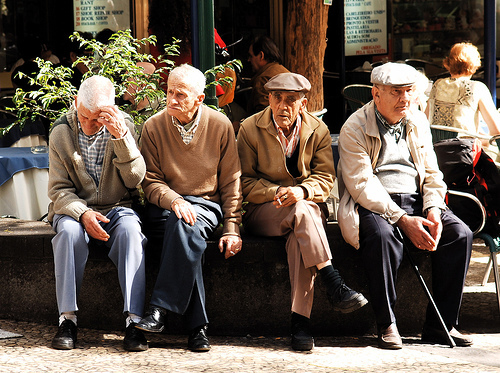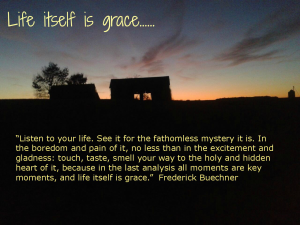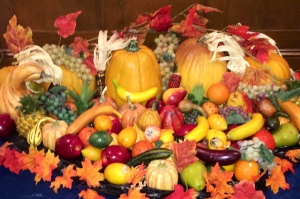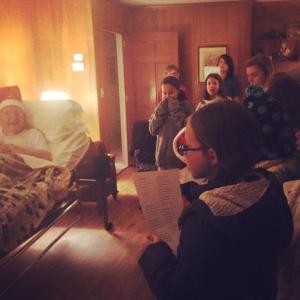 The following sermon is for an All Saints’ Day Service remembering the seven members of the First Christian Church of Farmville NC who died during the past year.
The following sermon is for an All Saints’ Day Service remembering the seven members of the First Christian Church of Farmville NC who died during the past year.
Revelation 22:1-7 NRSV
To be honest, the promise of going to heaven one day to live forever has not always appealed to me. Floating on a cloud playing a harp for all of eternity does not sound like good times. Furthermore, I have always been leery of Christians who seem to make going to heaven one day the whole point of what it means to be a Christian. It sounds rather selfish to me. And when I consider the selflessness of Jesus, the mission of Jesus, I believe that type of theology actually misses the whole point of what Christianity is all about.
I have also never desired to live in a mansion or walk on streets of gold. Again, because of what I know about Jesus’ identification with the poor, such opulence turns my stomach as a follower of Jesus.
However, there is one description of heaven in the Bible that I do find rather interesting, even attractive.
The most vivid, and perhaps the best description of heaven may be found in the last chapter of our Bible.
What does heaven look like?
Although the description is certainly symbolic, it is nonetheless beautiful. There is a holy city, and in the middle of the city’s main street, there is a river of the water of life, bright as crystal, flowing from the throne of God and of the Lamb.
What does heaven look like?
On both sides of the river, there is the tree of life, bearing twelve kinds of fruit, and the leaves on the trees have the power to heal the nations.
What does heaven look like?
Nothing accursed will be there. There will be no more hate; no more bigotry; no more ugliness; no more backbiting and powerplays; nothing that is vile, foul or evil.
There is nothing accursed in heaven, because the throne of God, the compete rule of God, and the Lamb, who is Jesus the Christ, will be there.
And here’s my favorite part. There is nothing accursed in heaven, because all of the servants of Christ will be there; together, gathered around the throne worshipping the Lamb face to face,
What does heaven look like?
Heaven looks like John Barefoot.
According to the gospel of Luke, when the angels announced that heaven was coming down to earth, they said: “I am bringing you good news of great joy.”
Almost a year ago, I believe those of us who went Christmas caroling to John Barefoot’s house were privy to a glimpse of what the joy of heaven looks like. For, as we sang around John’s bed where he was confined after suffering yet another debilitating stroke, something miraculous happened. God showed up. Heaven came down. As we watched John donning a Santa hat and wearing this smile that was so amazing that it had to be divine, as we watched him sing along with the children the best that he could, with a joy, this amazing joy, a joy that had to come from heaven, Christmas became real to us. Faith became real. God became real.
What does heaven look like?
Heaven looks alike Alawoise Flanagan.
According to Isaiah, heaven looks like children who are being comforted by their mother: “You shall nurse and be carried on her arm and dandled on her knees. As a mother comforts her child, so I will comfort you,” says the Lord.
Alawoise lived her life providing motherly comfort, not only to her own family, but also to the residents at the nursing home in Farmville where she devoted much of her life. And in the end, it was obvious that this one who comforted so many was herself comforted.”
I don’t believe there is any other way to explain the very last words Alawoise said to me. Just days before she died, after suffering more than anyone one deserves, she opened her eyes, and spoke, not words of complaint or bitterness, but words of a loving mother, or of a child who has been comforted by her heavenly mother. After I asked her how she was doing, she immediately asked me: “And, Jarrett, how is your family.”
What does heaven look like?
Heaven looks like Albert Mosley.
Nearly every time before I left Albert, even in ICU after a stroke that would take his life, he would miraculously say to me those words that Jesus often spoke to his disciples: “Peace be with you.”
And the miracle was not only that Albert could speak those words of peace, but was how it was obvious to all that in spite of every tribulation he encountered, Albert actually possessed this miraculous peace. And he truly wanted to share it with others.
The only way that I can possibly explain how Albert endured his suffering is that the God of Jesus, heaven itself, somehow, some miraculous way, came to Albert and filled him with this peace that surpasses all human understanding.
What does heaven look like?
Heaven looks like Donna Mosley.
As Jesus reminded us in the Sermon on the Mount, God looked upon Donna truly blessed her in ways that few of us here have been blessed. And I believe this is the real reason that no matter her disability, no matter how bad she felt, or how hard it was for her to walk, see, eat or breathe, when you asked her how she was doing, she would always respond: “I’m doing good!”
I believe Donna was a living testimony of Jesus words about heaven when he said: “Blessed are the poor in spirit, for theirs is the kingdom of heaven.”
Whereas we may look at those with whose spirits that are allowed to soar to achieve success as the world defines success as blessed and favored by God, the reality is that God looks with favor and blesses not those who are born with perfect bodies, 20/20 vision, and silver spoons in their mouths, but those whose spirits have many challenges and obstacles. And notice that Jesus uses the present tense. Not they will be blessed. Not might be blessed. They are, right now, right here, on this earth blessed. And their future is the kingdom of heaven.
What does heaven look like?
Heaven looks like Harry Albritton.
Having returned yesterday from Wyoming County, West Virginia, one of the most impoverished counties in our country, the words of Harry Albritton are fresh on my mind. Some of you here remember.
How many people do you know who after listening to a presentation at church about a mission trip opportunity to repair homes in the rural Mountains of West Virginia became so moved, so agitated and concerned that he stood up and spoke out, saying that he didn’t want to just put a Band-Aid on the poverty, but he wanted to actually do something to cure the poverty? He wanted to strategize, energize and mobilize to end the poverty, to repair the breach, to restore the streets, and make it a place where future generations could thrive.
He wanted to set up meetings with the CEO’s of corporations, with state and local government and investors and encourage them to build new factories in the area and offer employment. And if that did not work, he wanted to lobby Congress to provide tax incentives to create ways to re-locate the residents to the jobs.
Someone spoke up responded, “We can’t do that!”
He said, “What do you mean ‘we can’t?’ There’s no such thing as ‘can’t.’ You mean, we ‘won’t.’”
Only Harry.
It was the prophet Isaiah who painted this can-do portrait of God’s heavenly justice by admonishing God’s people: “to rebuild the ancient ruins, to raise up the foundations for future generations, to be called the repairers of the breach, restorers of the streets to live in” Isaiah 58).
What does heaven look like?
Heaven looks like Earl Umphlett.
Jesus tells us that God loves a quiet, generous giver.
‘So whenever you give alms, do not sound a trumpet before you, as the hypocrites do in the synagogues and in the streets, so that they may be praised by others. Truly I tell you, they have received their reward. But when you give alms, do it in secret; and your Father who sees in secret will reward you (Matthew 6:1-3).
Earl would quietly attend our Wednesday night suppers at church with Donna. As soon as they walked through the door, they would be greeted by Kim, our church administrative assistant who takes up money for each plate which costs $6.00.
Kim says that every time before Earl would for pay him and Donna, he would say the same thing. He said: “Look, I will make a deal with you. I don’t have any money on me today. But Donna will wash all of the dishes.” Then, when he’d catch Kim off guard, he would whip out a hundred dollar bill, put it in the basket, and say, “Keep the change.”
The only reason that I know this is that Kim told me this every Thursday morning after this happened. She says: “And he never says what all of the extra money is for! When he first did it, I thought he was pre-paying for him and Donna for an entire year of suppers. But, every week, he keeps doing it.”
This was just the type of Christian Earl was. Unlike some who brag openly about how much they give to the church, Earl gave quietly, unassumingly, inconspicuously. Earl did not have a pretentious, hypocritical bone in his body. Earl modestly served his Lord reticently, yet compassionately and generously.
What does heaven look like?
Heaven looks like Joseph Scott Thorne.
When Jesus found himself in the wilderness, Mark says that angels came down from heaven and waited on him.
Heaven is a place where no one is ever in need, because there are a multitude of angels waiting on us.
Although Scott was disabled, I could stand up here for the rest of the day and talk about the countless mission projects that Scott served on here in Farmville waiting on folks in need. He volunteered through the First Baptist Church, Monk Memorial Methodist Church, Emmanuel Episcopal Church and the Farmville Community Soup Kitchen. Scott spent incalculable hours volunteering his time to serve this community, many times working all through the night, painting, refurbishing, repairing, restoring, and landscaping.
Scott also shared his talents by working on many homes that needed repair throughout eastern North Carolina. Additionally, Scott volunteered at a homeless shelter in Tarboro doing whatever they needed him to do.
Along with local mission projects here in eastern North Carolina, Scott traveled to Gulfport, Mississippi to repair homes with this church after Hurricane Katrina. Scott also traveled to Moldova on a mission trip with the Oakmont Baptist Church of Greenville. Scott’s mission in life, despite his disabilities, was literally doing anything he could to serve someone else.
What does heaven look like?
Heaven looks like a river of life, bright as crystal. Heaven looks like a tree of life with branches of healing. Heaven looks like the rule of Christ, the Kingdom of God. And the good news is that heaven looks like the servants of God, worshiping the Christ.
John Barefoot taught us that heaven looks like amazing joy. Alawoise Flanagan taught us that heaven looks like a mother’s comfort. Albert Mosley taught us that heaven looks like a peace that is beyond our understanding. Donna Mosley taught us that heaven looks like eternal blessedness. Harry Albritton taught us that heaven looks like the prophet’s justice. Earl Umphlett taught us that heaven looks like selfless generosity. And Joseph Scott Thorne taught us that heaven looks like angels waiting on us.
They all taught us that heaven looks like Jesus. Heaven looks like who God is calling us to be as the church. Heaven looks like extravagant grace and unconditional love. Heaven looks like the selflessness of Christ, the mission of Christ.
So, maybe living forever is not so bad after all.

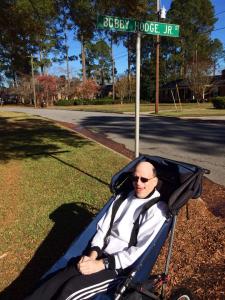
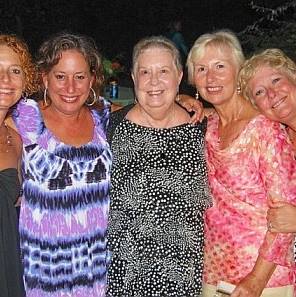 There are many ways that people measure their lives.
There are many ways that people measure their lives.
